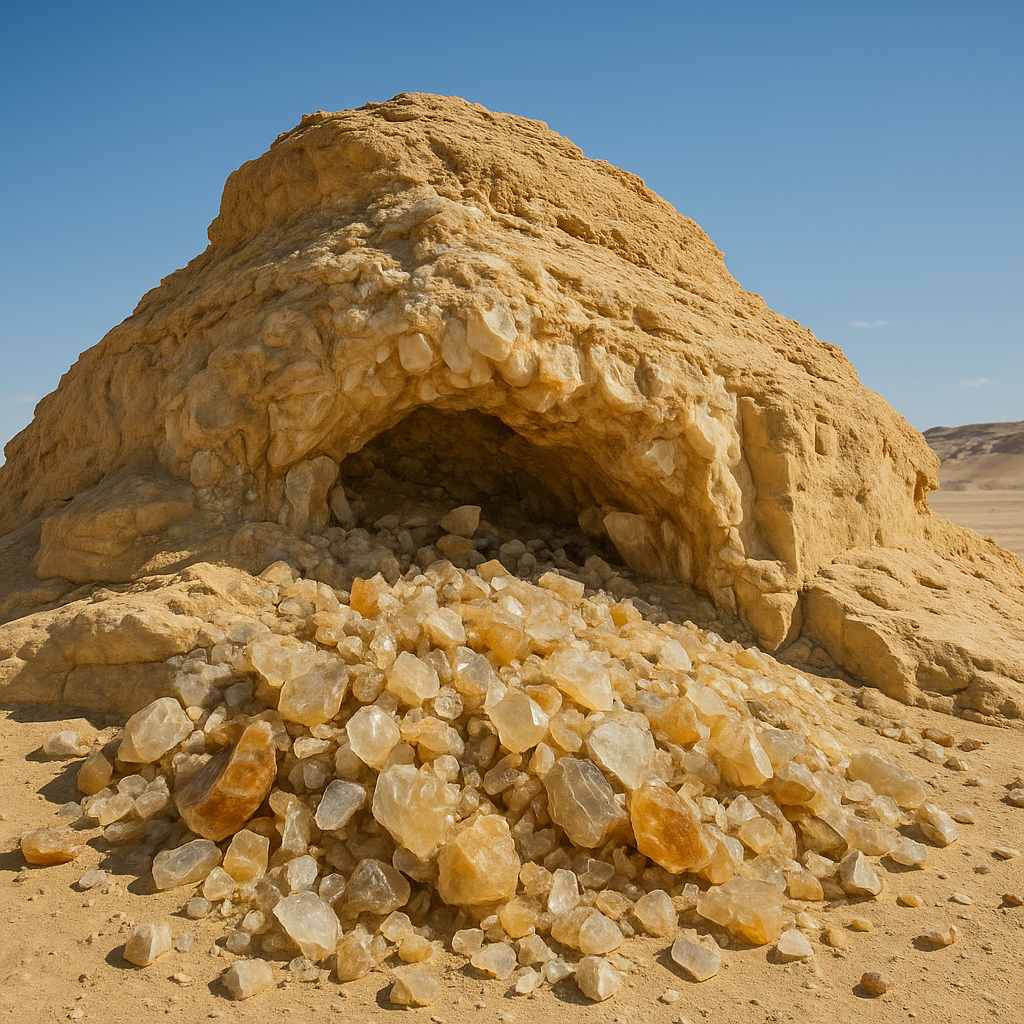Discover the Crystal Mountain in Egypt’s Western Desert. Learn about its geology, location, best time to visit, tours, travel tips, and why this sparkling ridge is a must-see attraction en route to the White Desert.


Post Introduction
Discover the Crystal Mountain in Egypt’s Western Desert. Learn about its geology, location, best time to visit, tours, travel tips, and why this sparkling ridge is a must-see attraction en route to the White Desert.
Post Content
Gleaming like a natural fortress carved from quartz and calcite, the Crystal Mountain in Egypt is one of the country’s most extraordinary geological landmarks. Located between the and the White Desert in the heart of the Western Desert, this shimmering outcrop dazzles visitors with its unique composition of sparkling crystals that glint under the desert sun. Unlike anything else in Egypt, the Crystal Mountain offers travelers a rare opportunity to see nature’s artistry displayed in its purest form.
The site is not just visually stunning—it’s also a fascinating geological wonder. The mountain is essentially a ridge formed of quartzite and calcite crystals, with some pieces scattered across the desert floor like shards of a giant’s broken mirror. Visitors often stop here en route to the White Desert, marveling at the crystal formations that seem to glow in daylight and sparkle beneath moonlight. For geologists, adventurers, and photographers, the Crystal Mountain in Egypt’s Western Desert is a must-see attraction that seamlessly blends natural history with unforgettable desert scenery.
Millions of years ago, immense geological pressure forced molten materials upward, embedding quartz and calcite crystals within the limestone layers of the Western Desert. Over time, erosion revealed these glittering treasures, forming what is now known as the Crystal Mountain. Unlike traditional mountains of rock and sand, this ridge shines with translucent minerals that catch and reflect sunlight.
Positioned between Bahariya Oasis and Farafra Oasis, the Crystal Mountain is often described as a “jewel of the desert.” It stands out against the stark sands and limestone cliffs, acting as a natural waypoint for travelers heading deeper into the White Desert.
At first glance, the Crystal Mountain looks like an ordinary desert hill. Step closer, however, and you’ll notice the rock face glistening with embedded crystals, forming shimmering surfaces and jagged textures. Large chunks of crystal have broken away over the years, scattering across the desert floor like gemstones in the sand.
Under the morning sun, the crystals sparkle like diamonds, while at sunset, they take on a golden hue. At night, with the desert sky as a backdrop, the mountain glimmers faintly under moonlight, making it an irresistible subject for photographers.
Although the Crystal Mountain is primarily a geological attraction, locals often regard it as a natural treasure of the Western Desert. Guides from Bahariya Oasis include it in desert safaris, proudly showing visitors the glistening stones and sharing stories about the land’s unique formations.
Today, the Crystal Mountain is a popular stopover on tours between Bahariya and the White Desert. For travelers, it serves as a fascinating introduction to the surreal landscapes that lie ahead.
“Add excitement to your Egypt itinerary with our guided The Black & White Desert tour.”
The Crystal Mountain is not a towering peak but rather a ridge around 6 meters high. The highlight isn’t the size but the sparkling surfaces and loose crystals scattered across the ground. Visitors often walk around, examining the quartz and calcite fragments, but collecting is discouraged to preserve the natural environment.
The site is typically included in Western Desert safari tours, often alongside the Black Desert and White Desert. Riding in a 4x4 vehicle across shifting sands, travelers can stop to admire the Crystal Mountain before continuing toward surreal chalk formations and desert landscapes.
The best time to visit is between October and April, when desert temperatures are mild and comfortable. Summer can be brutally hot, making exploration less enjoyable.
For photographers, the golden hours—just after sunrise and just before sunset—are ideal. The crystals capture the changing light, creating breathtaking contrasts and a magical glow.
Most journeys start in Cairo, where travelers drive or take tours to Bahariya Oasis, approximately 365 km southwest of the capital. From there, 4x4 desert excursions head toward the White Desert, with Crystal Mountain as a stop along the way.
Visitors typically book multi-day desert safaris, which include camping under the stars, exploring the Black Desert, and marveling at the surreal White Desert formations. The Crystal Mountain provides a sparkling interlude on these adventurous itineraries.
“Book your adventure now with our Siwa Oasis Desert Adventure
program for a once-in-a-lifetime experience.”
Unlike Egypt’s pyramids or temples, the Crystal Mountain showcases nature’s artistry rather than human achievement. Its shimmering beauty, combined with its location along the route to the White Desert, makes it an essential stop for explorers. It’s a reminder that Egypt’s treasures extend beyond pharaohs and tombs—its deserts hold wonders just as captivating.
The Crystal Mountain of Egypt’s Western Desert is a place where time, geology, and sunlight converge to create a dazzling spectacle. For anyone seeking to uncover Egypt’s hidden gems, this sparkling ridge promises a memory etched as brightly as the crystals themselves.
It’s composed primarily of quartz and calcite crystals embedded within limestone.
It lies between Bahariya Oasis and the White Desert, in Egypt’s Western Desert.
It’s around 6 meters high, forming a ridge rather than a towering peak.
No, visitors are discouraged from taking crystals to preserve the site’s natural beauty.
It’s usually visited as part of a 4x4 desert safari from Bahariya Oasis, accessible from Cairo.
October through April offers mild weather and ideal conditions for exploration.
Yes, it’s one of the most unique geological wonders in Egypt and a highlight of Western Desert tours.
Yes, under moonlight the crystals reflect a faint glow, creating a surreal photographic opportunity.
Nearby sites include the Black Desert, White Desert, and Bahariya Oasis.
Most tours stop for 30–45 minutes, enough to admire the crystals and take photographs.